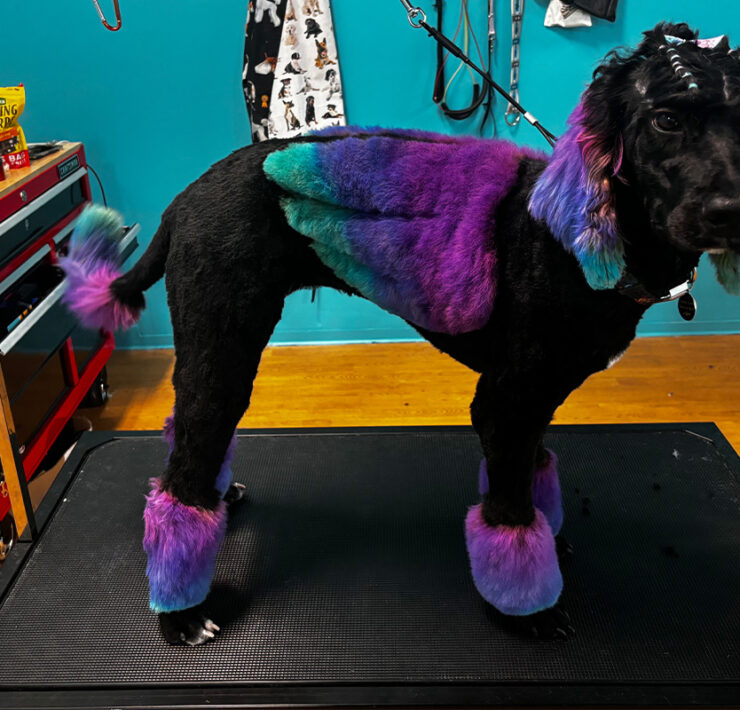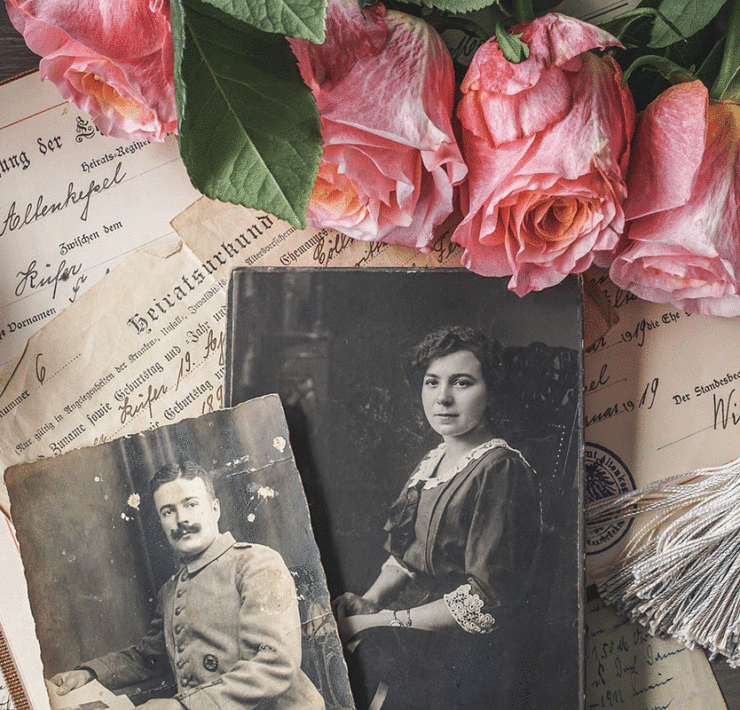Mizzou esports has a place to call home
- Photos by the University of Missouri and Jodie Jackson Jr
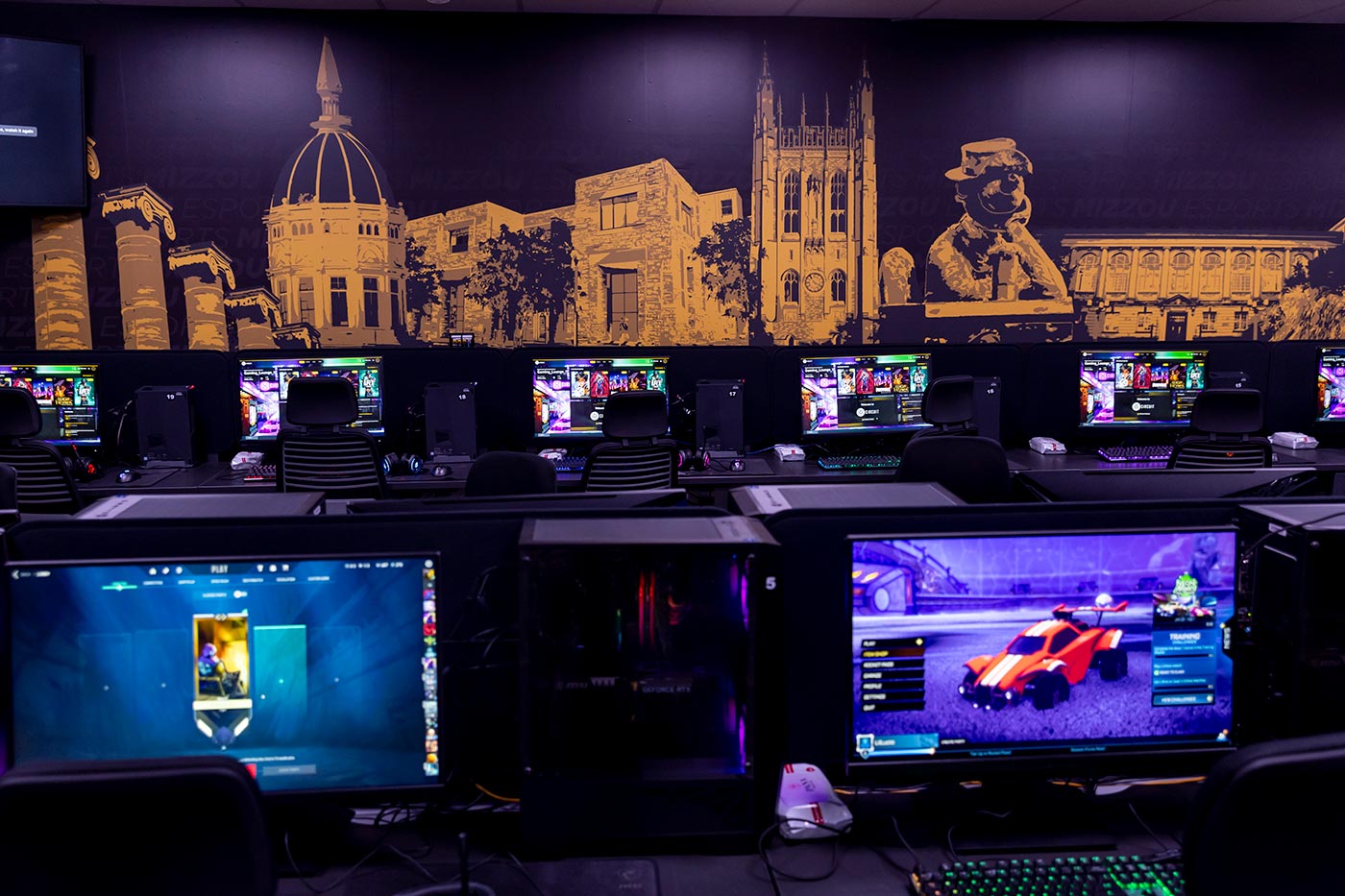
The gaming lounge and training facility is central to the esports community
Not the most popular in high school. Not sure if the Mizzou college experience was going to suit him. Not part of a ready group of friends to help navigate the big decisions about life and a career.
Blake Kronsbein, a 21-year-old St. Louis junior studying business marketing, says those elements of his story and background are representative of many of the esports athletes he has connected with at Mizzou, which officially unveiled a new 5,000-square-foot esports lounge on Feb. 2.
Just as esports now has a place to call “home” on the MU campus, so does Blake, the Mizzou esports general manager.
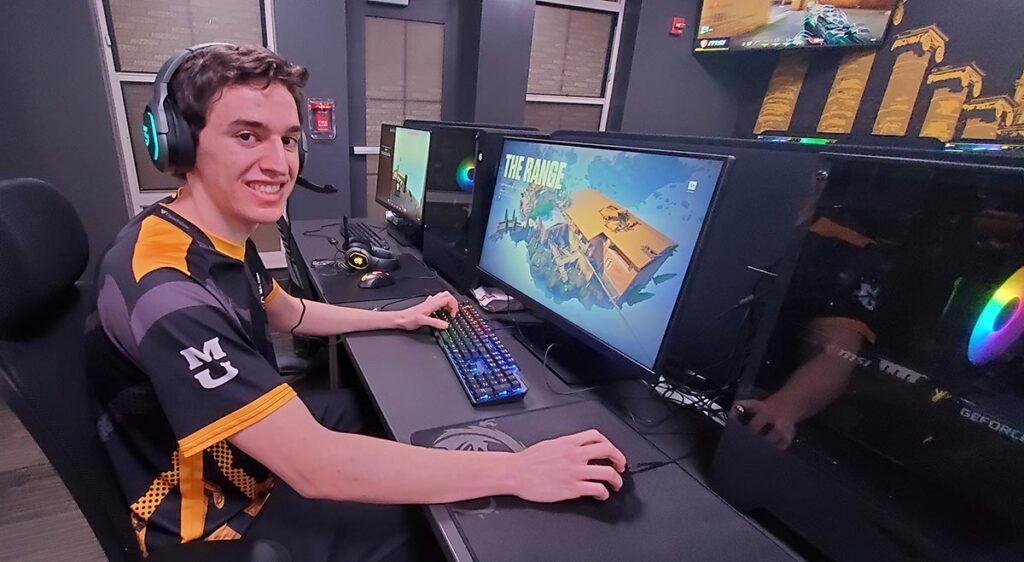
“I met all my friends in college through this program, so it’s really important to me. It wouldn’t have been possible if I’d never found this program,” Blake said moments before a gold-coated group of Columbia Chamber of Commerce ambassadors cut a ribbon to mark the esports lounge opening. “This is a place that’s a very inclusive environment for anyone of any background and interests. We all come together … that’s why this community is really important.”
Open to students and the community
The gaming lounge is part of the MSI Training facility for Mizzou esports practices and games. The lounge has 19 gaming computers, a seating area to watch streaming broadcasts of the games, and additional seating. The lounge, located in Center Hall, will be open from 4 to 10 p.m. on weekdays and noon to 6 p.m. on weekends. The lounge is a space for competitive and casual gamers alike and can be rented by community groups and businesses needing a meeting or esports recreation space.
There’s an hourly fee of $4 per hour for MizzouRec members and $6 per hour for non-members on weekends.
There’s a lounge area, a practice and competition room, and a broadcast room where Mizzou J-School broadcast students produce daily content, including streams and broadcasts of the premier games, which include Valorant, League of Nations, and others. In addition to the competitive premier teams, the lounge is also the landing place for club-level gamers.
Mizzou esports launched in August 2019 but didn’t have a place to call home. Until now.
“It is a culmination of effort and dedication from students, staff, and faculty in a dynamic space that best meets the needs of our students,” said Tyler Page, director of Residential Life. He emphasized the work in the broadcast room, which “showcases the talent of our students in front of and behind the camera.”
If this weren’t here, I don’t know what I’d be doing right now.
Blake Kronsbein, Mizzou junior and esports gamer
And I don’t know what I’d be doing with my career.
The lounge and training facility had a soft launch in October to work out any bugs and to get a better feel for how the esports program will operate in the space, says Ethan Cobb, assistant director for sports and competition with MizzouRec.
“No matter where you go, when you’re looking at large institutions, you have basketball courts, you have soccer fields, you have basketball courts, you have weight rooms so that people who enjoy those things can feel like they belong,” he says. “One thing we didn’t have here was something for our gamers to have that same feeling.”
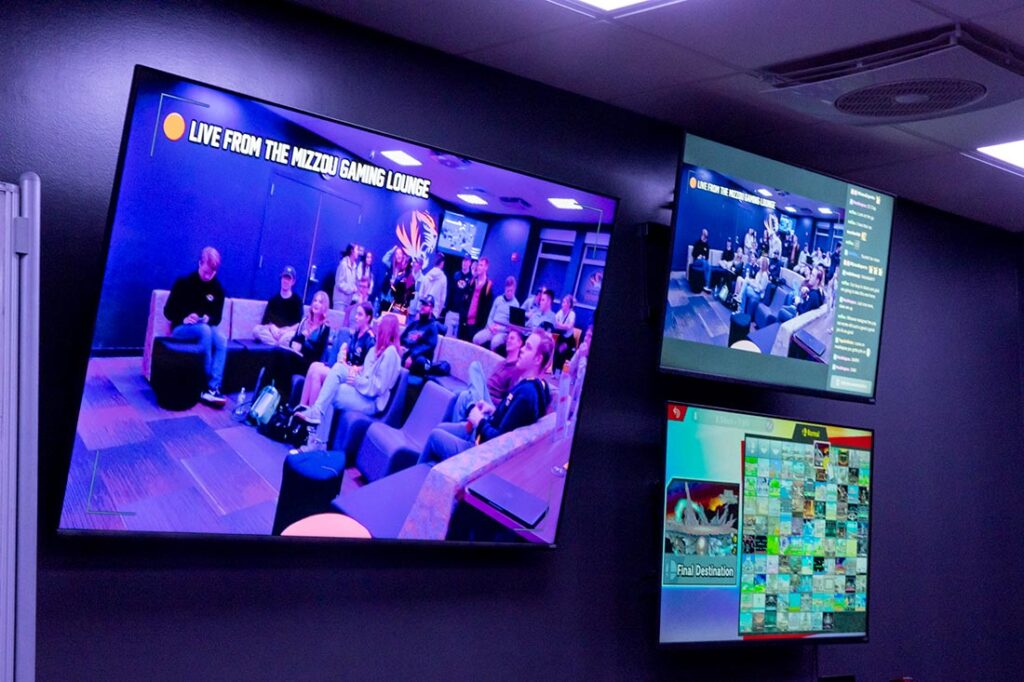
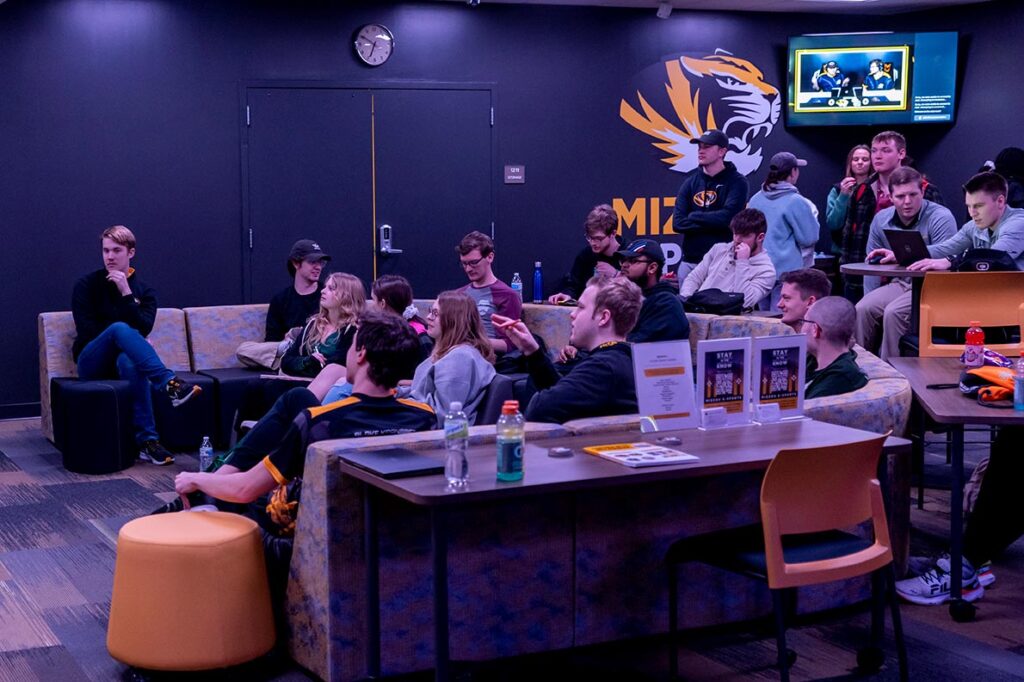
Ethan has now worked for four major institutions. Some had premiere teams, some had gaming lounges, and others had club teams.
“This is the first place I’ve worked at where we’ve had all of them,” he adds, suggesting that Mizzou esports can be a model for others to follow. “I think students around the country will have opportunities elsewhere because of what we’re doing here right now.”
‘We are not done’
For those not yet familiar with the popularity of esports, Ethan says to think of individual games as you might think of other club sports: Think of the games Valorant and League of Legends like you’d think of soccer and lacrosse. Those are individual sports under the sports banner.
The esports lounge will feature Mizzou’s five premier titles and club teams, as well as a space for hosting events, and tournaments, and for the community to rent and use. Summer esports camps are another “potential revenue producing” use, he says. “Those are things we’re working through right now.”
Esports is booming in Columbia—and across the country
The esports lounge opening is just the beginning, he adds.
“We are not done. We are going to look to grow every aspect of Mizzou esports, the facilities, the programs, the teams,” Ethan says. “It’s a challenge that we are welcoming. … there is no end to what the possibilities are.” He notes that the financial goal is to make the space “completely self-sufficient.”
The other primary goals are to create a unique student experience for gamers and to forge career paths for participants. That was a central focus of John Green’s comments at the grand opening event. John, a Mizzou esports advisor, is one of the individuals recognized as an “architect” of the esports program.
John coached a Mizzou esports team to a Rocket League championship in 2019. He was beaming at the Feb. 2 event.
“If you go look at the high schools, even in Missouri, they have their own leagues. They have their own state championships, they have their own facilities—with 30 or 40 computers in it—and they play games all the time,” he says. “We’re going to honor that expectation and provide opportunities for the students” at MU.
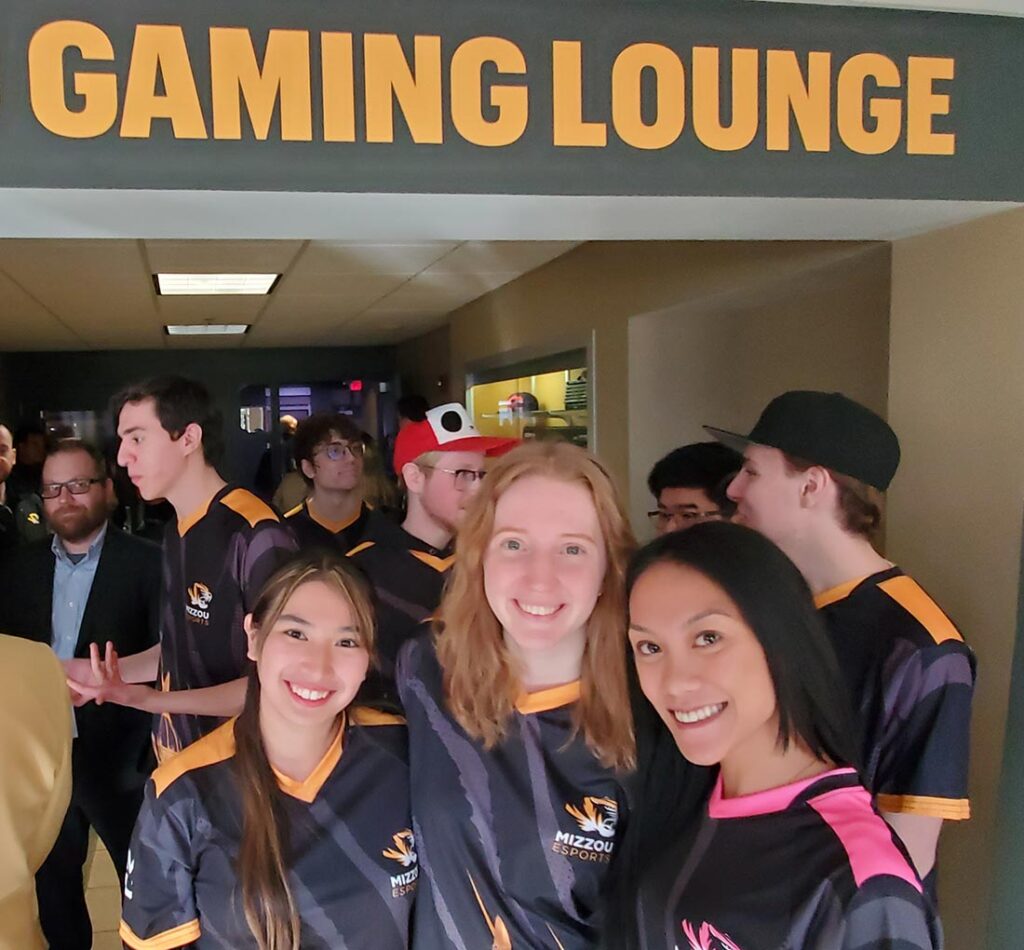
The esports industry job market
As far as career pathways “for the ones that really want to take it further than just a game,” the broadcast element of the lounge and sundry related roles can be viable careers, John says, adding tht esports is already a multi-billion-dollar industry.
Looking into the not-too-distant future, Mizzou esports can be in a proactive position to fill a hiring gap.
“Right now, everyone who’s in it was friends with a kid who was good at video games,” he explains. “There’s no classically trained individuals running everything. There’s this huge gap that academic Amera could come in and say, ‘Hey, I actually trained these kids on the equipment.’”
John says that’s not just wishful thinking.
“Once we start graduating kids in four or five years, we’re going to blow all of them away and we will just flood the industry with high quality talent,” he says.
Ethan says it was intramural and club sports—he was president of the bowling club—that was crucial for his undergraduate experiences.
“That is what kept me in school—finding something that made me feel like I belonged, finding people that I felt like I belonged with,” he says.
That echoes Blake’s sentiments.
“If this weren’t here, I don’t know what I’d be doing right now. And I don’t know what I’d be doing with my career,” Blake continues. “This has given me the opportunity to do what I love and be good at it and improve and gain real-life skills.
Esports and grade point average expectations
If you start to wonder if the esports gamers spend their days with their eyes glued to screens and their fingers burning up the keyboard, that’s not the reality.
“It is just like any other sport,” Blake explains. “Instead of us hitting the gym, we do our individual practice. Each game has a competitive mode where you play against other people and build your skills. That’s like working out for us.” There are also scrimmages with other collegiate premier teams. And there are grade point average requirements for classroom performance.
“Academics is super important to us,” he adds. “We have a minimum GPA for our premier program of 2.5, but our average is 3.3. It’s very important that our players balance their academics, their competitive side, and their social life.”
Ethan concurs, adding, “They’re putting in as much time, if not more during the week, working on the craft just like a lacrosse or a rugby player.”
Blake didn’t get involved in esports until arriving at Mizzou.
“I found Mizzou esports in the club pages and so I decided to see what was up,” he says. Blake discovered he was “pretty good at” Valoran, so he joined the team and eventually became captain. He founded the Valorant Club and made his way to the position of Mizzou esports general manager.
Ethan’s undergrad and now vocational career is steeped in intramural and club-level sports. He’s got some experience as a Madden gamer, and he knows the lingo and the basics of the premier leagues like Valorant and League of Legends.
“This is a learning curve for me as well,” he says. “I’m keeping up.”
But keeping up to the point of going head-to-head with the Mizzou esports gamers?
“No,” Ethan says, smiling as he shakes his head. “Not at all.”




